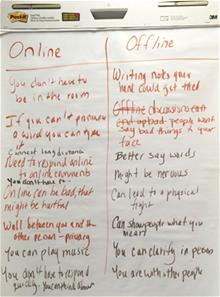 Many struggling middle school–age readers are still developing their reading skills even when explicit reading instruction is usually no longer part of their general education curriculum. Strategies to overcome this challenge are summarized in publications including Organizing Instruction and Study to Improve Student Learning, ILA Resolutions and Position Statements for Adolescent Literacy, and Writing to Read. These summaries stress the importance of providing students with opportunities to interact with texts through discussion and writing. With the advent of social media and other digital tools, written discussions now occur online. As these environments become more prevalent in classrooms, ensuring that struggling readers have access to the scaffolds and supports that make possible their successful participation is important.
Many struggling middle school–age readers are still developing their reading skills even when explicit reading instruction is usually no longer part of their general education curriculum. Strategies to overcome this challenge are summarized in publications including Organizing Instruction and Study to Improve Student Learning, ILA Resolutions and Position Statements for Adolescent Literacy, and Writing to Read. These summaries stress the importance of providing students with opportunities to interact with texts through discussion and writing. With the advent of social media and other digital tools, written discussions now occur online. As these environments become more prevalent in classrooms, ensuring that struggling readers have access to the scaffolds and supports that make possible their successful participation is important.
Universal Design for Learning (UDL), a framework based on the neurosciences, holds as a core belief that learner variability is the given. The UDL framework has been used recently to inform the development of an online reading environment for struggling adolescent readers, called Udio. Udio provides opportunities for students to participate in rich online discussions in support of reading comprehension.
I (Lori, a middle school teacher) had the opportunity to use Udio as part of a pilot study to support student interest and motivation in reading. I was excited about providing my students an opportunity to use online discussion as a way to interact more deeply with texts. Right from the beginning, students made it clear that they wanted to make their reading a social event, inviting others to read the same article so that they could engage in a conversation. However, the early online discussions consisted of short statements like “Yeah, I liked that, too” or “I agree.” Students needed additional supports and structures to develop meaningful discussions.
I began by reminding students that they had read folk tales in ELA, and we were going to read a folk tale on Udio. I asked students to read the folk tale article and then post a comment. We had been working on using evidence in our responses, and I was disappointed to see that students hadn’t posted much on Udio. I saw also that some students hadn’t understood the folk tale, so I printed the article, and students read it again, silently. We then had a face-to-face discussion about the article, discussing what happened to the main character and what is the moral of the story. I then asked students to read it one more time, online, and respond to each other using the sentence starters “First I thought…” “Now, I think…” suggested by Steve Graham.
This time, students engaged in a rich online discussion and deepened their understanding of the article. They were able to agree or disagree with each other online and used evidence to support their thinking.
After this experience, students engaged in a conversation about the differences between online and offline discussion. For this conversation, students used their extensive knowledge of online discussions from gaming environments in addition to our class work.
Students’ reported benefits of online discussions included
- You don’t have to be in the room with the person
- If you can’t pronounce a word, you can type it
- You don’t have to respond quickly, you can think about your answer
Students’ reported benefits of face-to-face discussions included
- You are with other people
- You can clarify in person
- You can show people what you mean
Students found that both types of discussions improved their understanding; however, the online discussions connected with their out of school literacy life online and was very motivating.
Udio is still under research and development. The following are links to tools and environments that support online discussions:
Ensure students have access to texts with Text-to-Speech readers
Provide interesting age-relevant texts
Provide ways for students to share their thinking through online discussions
The contents of this article were developed under a grant from the U.S. Department of Education (#H327M11000). However, those contents do not necessarily represent the policy of the Department of Education, and you should not assume endorsement by the federal government.

 Lori DiGisi is an administrator for Framingham Public Schools and a member of the ILA Board of Directors. Peggy Coyne is a research scientist at CAST, Inc.
Lori DiGisi is an administrator for Framingham Public Schools and a member of the ILA Board of Directors. Peggy Coyne is a research scientist at CAST, Inc.
This article is part of a series from ILA’s Technology in Literacy Education Special Interest Group (TILE-SIG).